MSI GT70 Dragon Edition Notebook Review: Haswell and the GTX 780M
by Dustin Sklavos on June 18, 2013 12:01 AM ESTSystem Performance
The new benchmark suite has left us in a bit of disarray, but thankfully we did have the CyberPowerPC Fangbook in recently. The Fangbook sports an Ivy Bridge CPU with exactly the same clocks as the i7-4700MQ powering the MSI GT70 Dragon Edition, and that gives us an excellent baseline for comparison.
I'd also like to personally thank NVIDIA for furnishing us with an Alienware M17x R4 equipped with a GTX 680M at the eleventh hour so we can get proper comparative results. Unfortunately, as you'll see the 780M in the GT70 Dragon Edition gets hamstrung by the CPU (more on this later) when tested playing games that hit the GPU and the CPU especially hard.
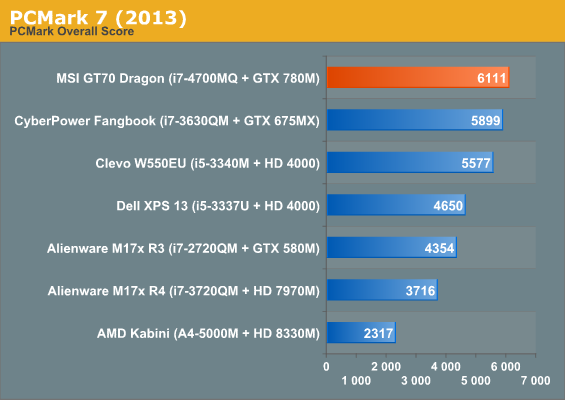
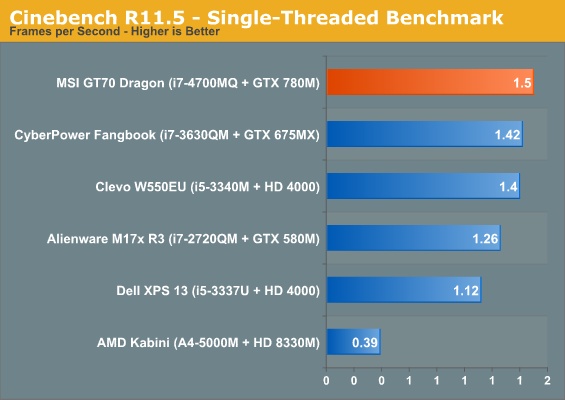
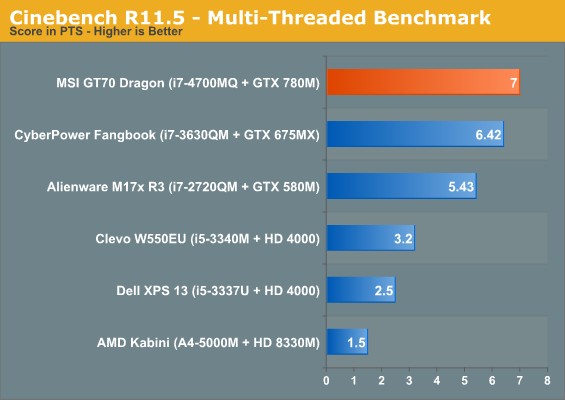
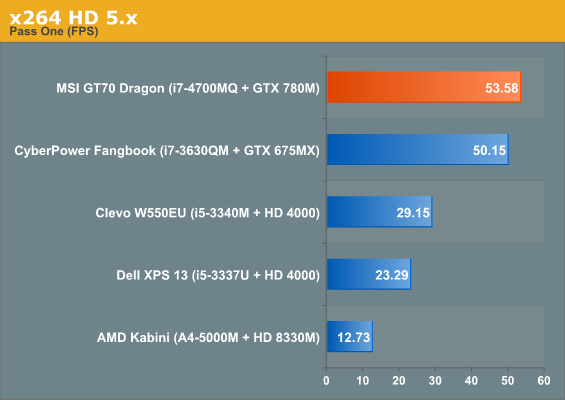
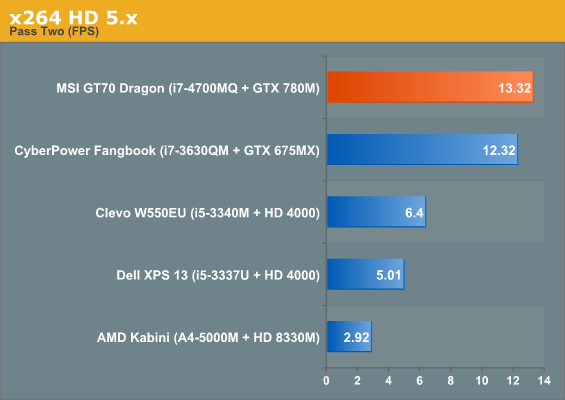
Haswell is certainly faster clock for clock, but obviously owners of Ivy Bridge-based notebooks shouldn't be chucking their old kit. Under most circumstances, the i7-4700MQ is less than 10% faster than the i7-3630QM.
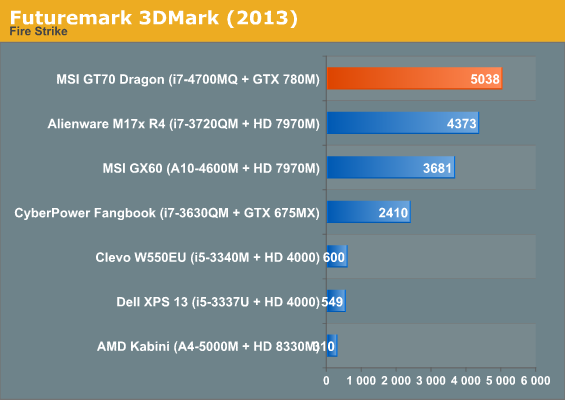
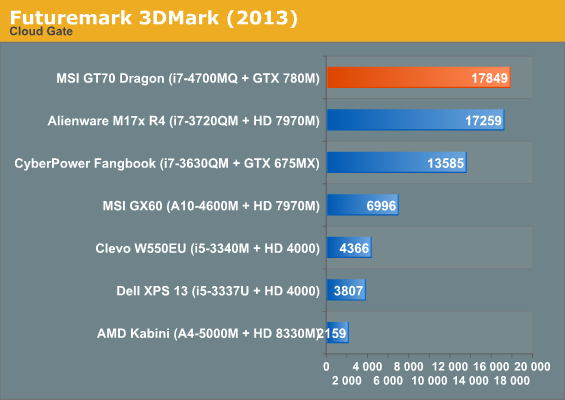
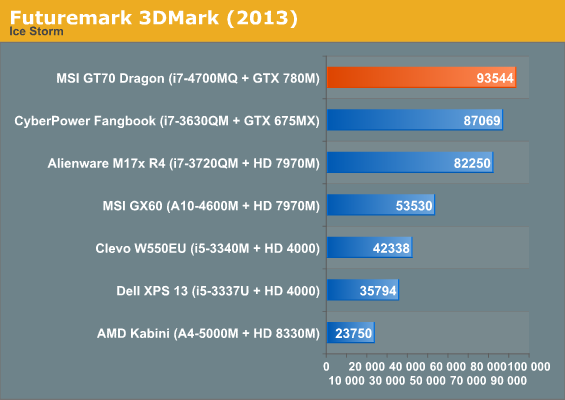
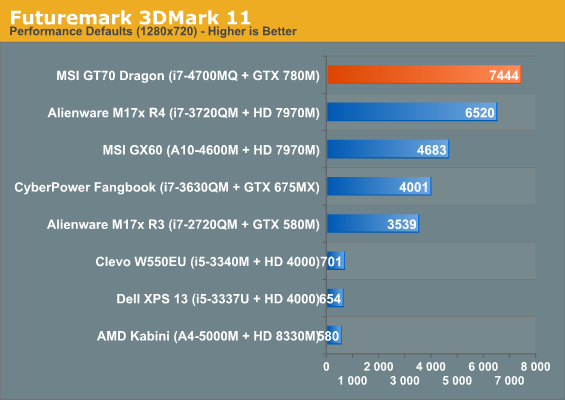
Pop on over to the 3DMarks and the 780M looks good, but unusually, not quite as good as it ought to. It has a commanding lead over the GTX 580M, and it should, but on Cloud Gate and Ice Storm it should also be blowing right past the 7970M. You'll get a better idea of what I'm talking about on the next page, when we look at actual gaming performance.










115 Comments
View All Comments
EzioAs - Tuesday, June 18, 2013 - link
I knew something was wrong when I saw the benchmarks and the GTX 780M was lower than the GTX 680M. Single fan. What were they thinking? I'd say just drop the RAID SSDs, lower the amount of RAM to 16GB and focus on a more terrific cooling. RAID SSDs and more than absurd amount of RAM isn't required for gaming.Sadly, it's just as you said Dustin, their "feature set" solution is the main attraction. A lot of people who spend tons on a gaming notebook (especially the less informed) would probably buy these just because it has more features even though it's reliability/usability goes down the drain.
axien86 - Tuesday, June 18, 2013 - link
It turns out both system builders AND OEMS were surprised that Intel overhyped and overpromised on the thermal performance characteristics of Haswell.First article to report this was PCPro UK: "Intel Haswell is hotter and slower than expected."
Second article by TheVerge: Can Intel deliver on Haswell Hype? Many OEMs interviewed indicate that Haswell does not mostly deliver on Intel's promise and claims.
http://www.theverge.com/2013/6/13/4426360/massive-...
EzioAs - Tuesday, June 18, 2013 - link
That's one thing. But just because they didn't get the promised thermal performance doesn't mean they should keep the poor cooling design. They did test products before it's released so they should know about the heat issues. I'm guessing they've decided to skip redesign and just let this model sell for it's features alone since not a lot of people read reviews, most of them just look at the specs and features. I'm very disappointed with MSIs decision in this matter.Their video cards coolers are one of the best (Twin Frozr and Cyclone are great), so you'd think you can expect something similar in one of their gaming laptops.
xdrol - Tuesday, June 18, 2013 - link
They did not start the design of this laptop when the first tests of Haswell arrived, rather they started on whatever Intel promised. If Haswell were supercool as promised, then a one-fan design would be good enough (making space for... 3x SSD raid for instance).mczak - Tuesday, June 18, 2013 - link
intel didn't overpromise. Sure everybody was somewhat expecting better perf/w but pretty much the only thing intel really promised was lower idle power. Besides, the TDP numbers were set ages ago and I haven't seen anything that they are off (yes turbo can exceed TDP but that's nothing new and clearly stated how it works in the datasheets). Plus it wouldn't really make a difference anyway as the cpu is only responsible for less than a third of the thermal budget of the cpu+gpu combo. (I have however no idea if the gtx780m itself is worse than what OEMs were expecting, at the very least I'd not be surprised there, because the gtx680mx was a imac exclusive because it exceeded the "usual" 100W TDP figure for mobile chips, and the gtx780m which is pretty much the same chip is in fact clocked higher AND supposedly is now using "only" 100W - unfortunately there's no power figures in this review compared to the older 680m which could help answer this.)Sabresiberian - Tuesday, June 18, 2013 - link
No, they slapped in components in an existing design that was already flawed. And, the major source of heat isn't the CPU, it's the GPU - CPU intensive performance that didn't use much GPU power was fine, it was only in apps where the GPU really needed to kick it up a notch, and the CPU also needed to supply top power, that the CPU throttled. Obvious conclusion: main source of throttling heat was the GPU, and it was woefully, badly, cooled, meaning the whole system was badly cooled.It was improperly cooled when the 680 part was in, and it's worse now.
And, I don't recall Intel ever saying that every CPU with the "Haswell" name on it would be low powered. The whole design is a step in the direction of achieving lower power, but the real low-powered parts are those intended for smaller, lighter form factors, not full-blown gaming notebooks.
Sabresiberian - Tuesday, June 18, 2013 - link
You missed the part in the article where OEMs said it was their adaptation of the Haswell CPUs that would slow down the proper adaptation of the lower powered SKUs, not Haswell itself. As per usual, most of them waited until the CPU was released to even think about new design considerations. Seriously, what's up with that?The major problem in the PC industry is that manufacturers have largely based their increases in sales by what Microsoft and Intel did; a new OS or new CPU used to mean new sales - but what if one or both of these companies takes a new direction, and OEMs don't take advantage of it? Lower sales and bad products is what happens. MSI has only itself to blame for the failures of this "could have been great" notebook.
alcalde - Thursday, June 27, 2013 - link
>would probably buy these just because it has more features even though it's reliability/usability>goes down the drain.
It doesn't "go down the drain" at all. It's still plenty fast enough to play almost every mainstream title at 1080p and high settings. Whether some other system gets 2 or 3 FPS higher on a particular game is really irrelevant.
>RAID SSDs and more than absurd amount of RAM isn't required for gaming.
Most people spending this kind of money are looking for more than a portable X-Box; they want a laptop they can use for demanding applications and be a desktop replacement. A desktop is more than a GPU.
TheinsanegamerN - Thursday, July 11, 2013 - link
yeah, those other laptops that run 2-3 fps faster? they also run 15-20c cooler without 50db of noise. they are better designed for the work they are doing. and raid ssds are useless for gaming. games are big, and id rather have a cache ssd and a big hdd for games. or a single big ssd. same deal with ram. if you actually need that much ram, you shouldn't be buying a gaming notebook.wdfmph - Tuesday, June 18, 2013 - link
Thanks for the review. I'm sure it's good. The test on Intel Core i7-4700MQ is absolutely necessary and it is the first review of the processor I have ever seen.I just don't get the concept of "gaming laptop". It's so against the general trend for a laptop, which calls for a thinner, lighter and more durable ones. For me it's ridiculous to carry around an 8 lbs "back breaker" and play 2 hour game on a small screen. Get a desktop maybe way better for PC gamers. Or get an console at 10% of the price of this beast.
I would really appreciate if anandtech can have a test on the new slim laptops, such as vaio pro 11/13, new Acer S7, or asus zenbook infinity.